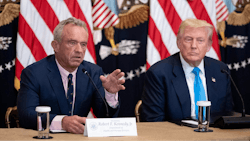Trump uses threat of pharma tariffs as leverage for ‘Most Favored Nation’ drug pricing
The Trump administration contends the threat of pharmaceutical tariffs will be enough to implement its so-called “Most Favored Nation” (MFN) drug pricing policy, which seeks to match the costs of prescription drugs in the U.S. to the lowest price offered in other developed nations.
“The cost of medicine all over the world is much cheaper than the United States,” President Donald Trump said during Tuesday’s cabinet meeting. “We’re going to have equalization, so we pay the same price as the lowest drug sold anywhere in the world.”
In May, Trump signed a sweeping executive order designed to cut the price of drugs in the U.S. by up to 90%. In late July, Trump sent letters to 17 large pharmaceutical companies demanding they get onboard with the drug pricing — calling on manufacturers to provide MFN prices to every single Medicaid patient, among other provisions — and warning that if they refuse his administration “will deploy every tool in our arsenal” to ensure compliance.
The letters stated the pharma companies have 60 days to meet the Trump administration’s requirements.
“We have to get the drug companies to do it, and they’ll do it because we have tremendous power over the drug companies,” Trump said in Tuesday’s cabinet meeting. “I will put charges and costs and tariffs onto them that will be many times more than what they’re going to be paying.”
While Trump has given several reasons for implementing tariffs, including pressuring drugmakers to move their manufacturing operations back to the U.S., his administration now appears to be focused on the threat of levies as a cudgel to implement the controversial MFN drug pricing policy.
Health and Human Services Secretary Robert F. Kennedy Jr. said in the cabinet meeting that his department is “deep into MFN negotiations” with 14 pharmaceutical companies. Kennedy also praised Commerce Secretary Howard Lutnick, calling him a “breath of fresh air” and said he is “going to help us get across the finish line with the leverage that we have from tariffs.”
Under Section 232 of the Trade Expansion Act, the Department of Commerce is investigating the feasibility of increasing domestic capacity for pharmaceuticals and pharmaceutical ingredients to reduce import reliance, and whether pharma-specific tariffs are necessary. Earlier this month, Trump warned that levies on pharmaceutical imports to the U.S. could reach 250% and take up to a year-and-a-half for them to be put in place.
In Tuesday’s cabinet meeting, Lutnick told Trump the “combination of Bobby’s MFN and the [Section] 232 pharmaceuticals [probe], which we launched together, when you put those two together, it really gives Bobby the tools to go execute your plan.”
However, MFN will not be an easy sell for the White House. Trump acknowledged in his letters to drugmakers last month that “industry proposals have fallen short.” The trade group Pharmaceutical Research and Manufacturers of America (PhRMA) has repeatedly stated that MFN policy isn’t the way to lower drug prices and has opposed pharma tariffs.
In its comments to the Commerce Department’s ongoing Section 232 investigation, PhRMA said pharma-specific tariffs “are not the answer for promoting greater domestic production of these products” and that the industry already has a strong U.S. manufacturing presence and is making “major investments” that tariffs “would jeopardize.”
About the Author
Greg Slabodkin
Editor in Chief
As Editor in Chief, Greg oversees all aspects of planning, managing and producing the content for Pharma Manufacturing’s print magazines, website, digital products, and in-person events, as well as the daily operations of its editorial team.
For more than 20 years, Greg has covered the healthcare, life sciences, and medical device industries for several trade publications. He is the recipient of a Post-Newsweek Business Information Editorial Excellence Award for his news reporting and a Gold Award for Best Case Study from the American Society of Healthcare Publication Editors. In addition, Greg is a Healthcare Fellow from the Society for Advancing Business Editing and Writing.
When not covering the pharma manufacturing industry, he is an avid Buffalo Bills football fan, likes to kayak and plays guitar.
